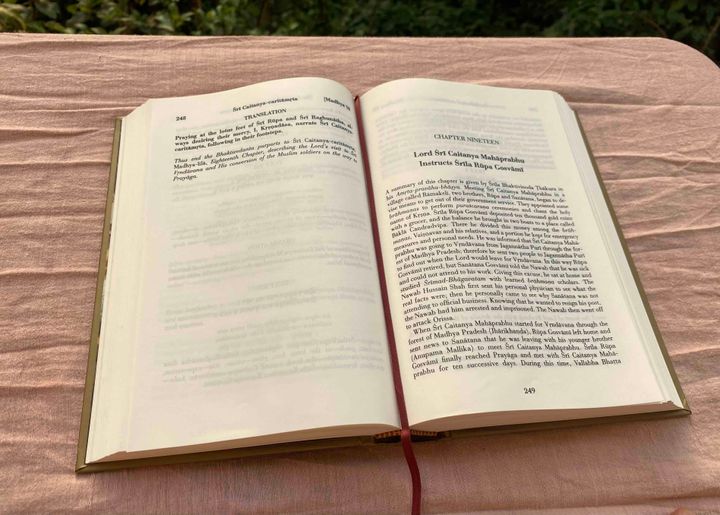R-s 2 🐜 Zooming OUT

❧ Cc Madhya 19.138 ❧
This week we are memorizing two verses instead of one.* So to give you extra time to memorize the verses, and also in order to not conflict with devotees' Nṛsiṁha Caturdaśī celebrations, I am moving our verse recitation on Zoom a couple days later to Tuesday the 17th (or Monday in some time zones). Find the timings and links at the bottom of this page.
Below is the video I made for the first verse of this week.
Once you've watched it, I'd love to get your feedback so that I can improve the next video. Some things I got mental about were the memorization practice part being too long and repetitive and the goofy parts not fitting the tone of the topic. Do you agree? I really do appreciate any and all feedback. Just so you know, you can be totally free in how you express your critique. I'm not so sensitive in that regard.
I find it helpful to always recap so we can get the flow and context of the verse. Therefore, I'll be beginning each posting and video with the previous verses we went over. Remember: when you go through these verses, try to focus on the Bengali rather than the English translation. The translation is there only to aid you in understanding the Bengali.
Let's begin!
Śrī Caitanya-caritāmṛta (Madhya-līlā 19.135–138)
Text 135
ei-mata daśa dina prayāge rahiyā
In this way, for ten days Śrīman Mahāprabhu stayed at Prayāga [and]
śrī-rūpe śikṣā dilô śakti sañcāriyā
instructed Rūpa Gosvāmī, thus empowering him.
Text 136
prabhu kahe, — śunô, rūp, bhakti-raser lakṣaṇa
Śrīman Mahāprabhu said, “Listen, O Rūpa, bhakti-rasa’s symptoms...
sūtra-rūpe kahi, vistār nā ĵāya varṇana
in sūtra form I will tell. In full, it is not possible to describe.
Text 137
pārāpāra-śūnya gabhīr bhakti-rasa-sindhu
Shoreless and deep is the ocean of bhakti-rasa.
tomāy cākhāite tāra kahi eka ‘bindu’
To give you a taste of it, I am describing one drop.
and now, the verse we're focusing on today:
Text 138
ei-mata brahmāṇḍa bhari’ ananta jīva-gaṇa
In this way, the universe is filled with countless living entities.
caurāśī-lakṣa yonite karaye bhramaṇa
In 84 lakhs (8.4 million) species, they rotate.
Word-for-word meanings:
① ei-mata — in this way; brahmāṇḍa — the universe (lit. Brahmā's aṇḍa, egg); bhari’ — having filled; [with] ananta — unlimited; jīva-gaṇa — living entities; ② caurāśī-lakṣa — 84 lakhs; yonite — in species of life; [are] karaye bhramaṇa — wanders, rotate.
Now, I will explain the grammar for the words yonite and karaye bhramaṇa
Bengali lesson 1: how to say "in"
In English we use prepositions: in the temple, from the devotee, around Govardhāna, etc.
In Hindi and Bengali, postpostitions are used. That means that words such as in, from, and around come after the noun. For example: the temple in, the devotee from, Govardhāna around, etc.
(Lots of times the noun before the postposition takes the possesive case, but we'll get more into postpositions another time. For now, we're just learning how to say "in".)
The simple rules for making the postposition "in" are:
- to words ending in a consonant, add the ending -e:
Examples: Vṛndāvane = in Vṛndāvana; mandire = in the temple; bhakte = in the devotee.
Note: the short 'a' is not written after consonants in Bengali script, so that's why it is considered there's no vowel at the end of Vṛndāvana, mandira, etc. even though many people write 'a' at the end in Roman transliterations. - to words ending in a vowel, add the ending -te (or optionally -y for words ending in ā):
Examples: yonite = in the species; Kāśīte = in Kāśī; Gītāte (or Gītāy) = in the Gītā; Varṣānāte (or Varṣānāy) = in Varṣānā.
Bengali lesson 2: Verb tenses
In Bengali, the names of verbs, verbal nouns, end (mostly) in ā. For example: korā (to do), dekhā (to see), bolā (to speak). To change the tense of the verbal noun, all you need to do replace the -ā with different endings. For example, to make the word korā (to do) future tense, you change the -a to -bo: korbo (I will do). For past tense, change -ā to -echi: korechi (I did). You don't need to catch this all now. The basic point I'm trying to get across is that the verb tense changes according to the ending you attach to it. We will learn about different tenses as they come up in the verses.
Bengali lesson 3: Turning a noun into a verb with korā
If you attach korā (to do) to a noun, you can turn it into a verb. For example in the verse we're learning today, bhramaṇa on its own is a noun meaning travel, journey; walking; rotation, whirl. But when we add korā to it – bhramaṇa korā – it becomes a verb meaning to travel; to walk; to rotate, to whirl.
Here's another example of the word varṇan used in verse 136:
varṇan [noun]
description; narration; delineation.
varṇan korā [verb]
to describe; to narrate; to delineate.
That's our little Bengali lesson for this week. :)
Some thoughts on this verse
We’re so zoomed into our tiny lives, that we take everything that happens to us here so seriously. When I experience the world from the viewpoint of an ant, I still think everything I'm doing is so important.
If I had the ability to zoom out, I'd see that I’ve been spending most of my existence going through numerous lower species and only for a split second do I have this life as a human. But, sadly, as always, I waste my life doing stupid things that I think are important and again fall into the lower species.
The way we see ants to be short-lived and insignificant is probably the way higher beings like the demigods see us. From that perspective, all my friends, family, the good name I earned, everything that I think about myself — all of it — is over before they know it. Really, no problem, embarrasement, or suffering that I experience matters in the long run. What does matter—the only thing that matters—is how I use this very limited time I have toward making progress in bhakti. And we have all the help we could ever hope for in the form of śrī gurudeva, the Vaiṣṇavas, Śrīmad-Bhāgavatam, Tulasī-devī, Ekādaśī and on and on.
But just because we've come in contact with this great fortune doesn't mean that we're suddenly safe from falling down into the lower species again. We must be careful not to get too lax and comfortable thinking that it's all a free ride back home. I just uploaded a sobering clip where my Gurudeva cautions us in this regard:
This beginning section, verses 138 to 151, is like a doorway into the rest of Rūpa-śikṣā, where Mahāprabhu will instruct Śrīla Rūpa Gosvāmī on sādhana-bhakti, bhāva-bhakti and prema-bhakti, and all ingredients of bhakti-rasa beyond.
If we don’t first understand the reality of our present situation depicted in this beginning section, then we’ll lack the feeling of urgency required to seriously enter into the rest of Rūpa-śikṣā. We'll simply see the later topics through the filter of our shallow, mundane, distorted vision.
It is only by the mercy of our rūpānuga-guru-varga that we come to understand any of this.
Aspiring to please Śrīla Gurudeva and the Vaiṣṇavas,
-Madhukar das
Updated Zoom timings links for this week
As I mentioned at the beginning of this post, this week we'll be meeting two days later (Tuesday instead of Sunday) to recite this week's verses together. Below are the two Zoom sessions that you can choose from according to what fits your time zone and schedule best.
Please take note that there are two separate Zoom links. Last week, a few people tried to join "Zoom session 2" with the link from "Zoom session 1". Make sure you click on the correct link!
Zoom session 1
LINK: https://us02web.zoom.us/j/88167815105?pwd=hdz5G2BmSjDQUin3kmz9Qr1aakdGPC.1
Indian Standard Time —— May 17, Tue, 7:30 AM
UTC —— May 17, Tue, 2:00 AM
British Summer Time —— May 17, Tue, 3:00 AM
Central European Summer Time —— May 17, Tue, 4:00 AM
South Africa Standard Time —— May 17, Tue, 4:00 AM
Eastern European Summer Time —— May 17, Tue, 5:00 AM
Hong Kong Time —— May 17, Tue, 10:00 AM
Australian Central Time —— May 17, Tue, 11:30 AM
Australian Eastern Time —— May 17, Tue, 12:00 Noon
Hawaii Daylight Time —— May 16, Mon, 5:00 PM
Pacific Time —— May 16, Mon, 7:00 PM
Central Time —— May 16, Mon, 9:00 PM
Eastern Time —— May 16, Mon, 10:00 PM
Brazil Time —— May 16, Mon, 11:00 PM
Zoom session 2
LINK: https://us02web.zoom.us/j/81730796111?pwd=nQOMM-tDEI2gALJbdKkPhda2EAysDX.1
Indian Standard Time —— May 17, Tue, 8:30 PM
UTC —— May 17, Tue, 15:00
British Summer Time —— May 17, Tue, 4:00 PM
Central European Summer Time —— May 17, Tue, 5:00 PM
South Africa Standard Time —— May 17, Tue, 5:00 PM
Eastern European Summer Time —— May 17, Tue, 6:00 PM
Hong Kong Time —— May 17, Tue, 11:00 PM
Australian Central Time —— Wed, 12:30 AM
Australian Eastern Time —— Wed, 1:00 AM
Hawaii Daylight Time —— May 17, Tue, 6:00 AM
Pacific Time —— May 17, Tue, 8:00 AM
Central Time —— May 17, Tue, 10:00 AM
Eastern Time —— May 17, Tue, 11:00 AM
Brazil Time —— May 17, Tue, 12:00 Noon
If you are not able to make it to the Zoom meeting, you can share your verse recital with me privately over WhatsApp (my number is +91 7895939316) or you can share it in our Telegram group. Last week I made a typo in the Telegram group link, but it should work now:
See you then!



Comments ()